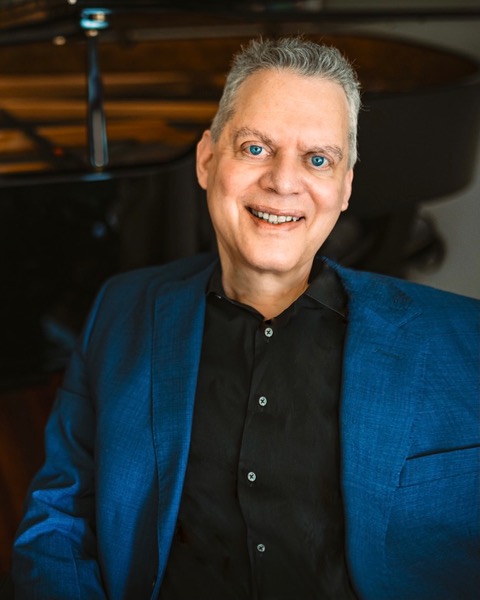Wednesday’s rehearsal always has a special place in these one-week residencies. It’s the last time we still feel we’re free to play, discover, develop. I can bring up some of the bigger issues I want each singer to be thinking about, and they still have the brain-space to process what I am telling them. Wednesday you can entertain options. By Thursday you have to make decisions.
When I got to the hall today, I found the four singers busy staging Noël Coward’s “In a Bar on the Piccola Marina.” The small, L-shaped assembly of platforms that form our stage had been hauled out and the playing area was now defined. I sat and watched them work out the blocking—we’d already talked about the characters and mood and style of the piece. It’s originally a solo song, but I’ve turned it into a group number with a cavalcade of characters. Central among them is Mrs. Wentworth-Brewster, who enjoys her widowhood by taking up with a series of gondoliers in Capri. Her son and daughter are appalled, but she waves them away—“Funiculi, funicula, funic-yourself!” she spews.
Usually I give the role of Mrs. W-B to the mezzo, but this time I had the instinct to offer it to Elaine Daiber, my soprano. I heard she was not only a gifted actress, but also that she had done a fair amount of training in the Meisner Technique, one of the most respected schools of acting in America. Elaine is a bold, take-no-hostages kind of performer, perfect to play this libidinous dowager (and Olivia is hysterical as her repressed daughter). I let the four of them work everything out, occasionally offering a piece of shtick from a previous staging or a brand-new idea to enhance their version. All the performers have a good sense of stage space and timing, and they have forged a strong ensemble in just a few days.

We decided to stay with the group numbers for a while. I sat back and watched the process with joy—and amusement. “Is my character in the ‘Kling-Kling Bird’ really upset to turn down all those women if he’s actually got a boyfriend at home?” It’s the kind of question I rise to, especially since I had invented this scenario in the first place—there’s no mention of a boyfriend in the original. “Well, Jesse, he’s 90% gay,” I said authoritatively. “But he’s also pretty horny, and he hasn’t had sex in far too long. Normally he’s a twice-a-day guy. So yes, he promised to be faithful. But he’d be OK sleeping with a woman at this point. And they all seem to want him. He’s susceptible.” A pause. “It’s as if…” How do I explain this to a tenor? Ah, I have it. “It’s as if he’s really a Don Ottavio, Edgardo, Nemorino-weight voice, but a small out-of-the-way theater offers him a Don José. He shouldn’t do it, but he’s tempted—after all, no one will see it, and what harm could it do?” Jesse smiled. He got it. After all, he himself is a lyric tenor who no doubt has dreams of taking on a heavier rep in the distant future.

I let them work everything out, only stepping in from time to time to help them with a staging problem. In the previous three iterations of “Ports of Call,” one of the guys scooped the other into his arms as they sang the final high note, lifting him into the air. That didn’t seem to be in the cards with these two, so I suggested that Jesse and Thomas end the song in a dip. “I should kiss him, shouldn’t I?” asked Jesse. “Well, um, yeah, if you want to, that would be OK….” I’m not into making people kiss onstage, particularly not two straight guys, but we went through various permutations of dip-kiss-high note, kiss-dip-high note, until the thing timed out right.
Welcome to 2019, I thought to myself.
About five or six songs have a bit of choreo, but even the art songs need some kind of theatrical feel. Finding the special atmosphere of each piece is the most interesting part of our work. But for me, the atmosphere begins with getting the musical flow just right. Sometimes it’s a question of breath control, or support, or of coaxing the music into the sweet spot of your vocal cords. Part of the process is repetition, part of it is encouragement. And sometimes I just have to induce labor by seeing what’s holding up the works. This led to some good discussions with each of the singers—particularly with Jesse, who is new to me. There’s gold in that voice, and I want to help him mine it.

There were many beautiful moments. Olivia stops time with “Calling You,” our opening number, and Elaine (with near-perfect French today) is finding the wounded sensuality of her “Hôtesse arabe.” One of the loveliest performances was also one of the quietest: Thomas West singing the Afrikaans song “Mali, die Slaaf, se Lied”—“The Song of Mali the Slave” by the South African composer Stephanus le Roux Marais. It’s a plaintive ballad in two verses with a folky melody. In the right hands it can become quite eloquent, and Thomas’ are about the rightest I can imagine. It’s a tune that could sound a bit banal, like second-drawer Jacques Brel, but Thomas sings it with such feeling and such delicacy that I felt as if we’d stumbled on a beautiful, unknown Schubert song. I had a few notes for him—a couple of spots where the melody needed to be more continuous, and two phrases that landed a touch under pitch. Then I said, “How about me? Am I giving you what you need?” With infinite tact, Thomas made a number of suggestions for dynamics and phrasing. “Mark them in my score—I promise to get it right for you.”
Tomorrow, our first stumble-through. We’re ready.


0 Comments